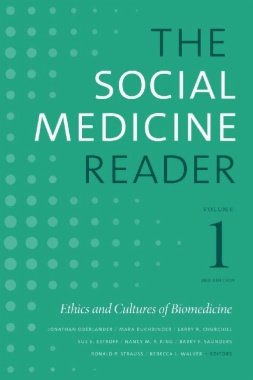The extensively updated and revised third edition of the bestselling Social Medicine Reader provides a survey of the challenging issues facing today's health care providers, patients, and caregivers by bringing together moving narratives of illness, commentaries by physicians, debates about complex medical cases, and conceptually and empirically based writings by scholars in medicine, the social sciences, and the humanities.
Volume 1, Ethics and Cultures of Biomedicine, contains essays, case studies, narratives, fiction, and poems that focus on the experiences of illness and of clinician-patient relationships. Among other topics the contributors examine the roles and training of professionals alongside the broader cultures of biomedicine; health care; experiences and decisions regarding death, dying, and struggling to live; and particular manifestations of injustice in the broader health system. The Reader is essential reading for all medical students, physicians, and health care providers.
- Cover
- Contents
- Preface to the Third Edition
- Introduction
- Part I. Experiences of Illness and Clinician-Patient Relationships
- Silver Water
- “Is She Experiencing Any Pain?”: Disability and the Physician-Patient Relationship
- The Cost of Appearances
- The Ship Pounding
- God at the Bedside
- The Use of Force
- Sunday Dialogue: Conversations between Doctor and Patient
- What the Doctor Said
- Part II. Professionalism and the Culture of Medicine
- The Learning Curve
- The Perfect Code
- Coeur d’Alene
- The “Worthy” Patient: Rethinking the “Hidden Curriculum” in Medical Education
- How Doctors Think: Clinical Judgment and the Practice of Medicine
- Healing Skills for Medical Practice
- The Hair Stylist, the Corn Merchant, and the Doctor: Ambiguously Altruistic
- Necessary Accessories
- The Critical Vocation of the Essay
- The Art of Medicine: Asthma and the Value of Contradictions
- Script
- Ordinary Medicine: The Power and Confusion of Evidence
- “Ethics and Clinical Research”: The 50th Anniversary of Beecher’s Bombshell
- Part III. Health Care Ethics and the Clinician’s Role
- Glossary of Basic Ethical Concepts in Health Care and Research
- Ethics in Medicine: An Introduction to Moral Tools and Traditions
- Historical and Contemporary Codes of Ethics: The Hippocratic Oath, the Prayer of Maimonides, the Declaration of Geneva, and the AMA Principles of Medical Ethics
- Enduring and Emerging Challenges of Informed Consent
- Teaching the Tyranny of the Form: Informed Consent in Person and on Paper
- A Terrifying Truth
- The Lie
- Discharge Decisions and the Dignity of Risk
- No One Needs to Know
- Part IV. Death, Dying, and Lives at the Margins
- Forty Years of Work on End-of-Life Care: From Patients’ Rights to Systemic Reform
- Try to Remember Some Details
- Failing to Thrive?
- The Dead Donor Rule and Organ Transplantation
- The Darkening Veil of “Do Everything”
- Death and Dignity: A Case of Individualized Decision Making
- Active and Passive Euthanasia
- Clinician-Patient Interactions about Requests for Physician-Assisted Suicide: A Patient and Family View
- My Father’s Death
- Part V. Allocation and Justice
- Glossary: Justice and the Allocation of Health Resources
- Dead Man Walking
- Full Disclosure: Out-of-Pocket Costs as Side Effects
- Seven Sins of Humanitarian Medicine
- Who Should Receive Life Support during a Public Health Emergency? Using Ethical Principles to Improve Allocation Decisions
- About the Editors
- Index
- A
- B
- C
- D
- E
- F
- G
- H
- I
- J
- K
- L
- M
- N
- O
- P
- Q
- R
- S
- T
- U
- V
- W
- Y
- Z

